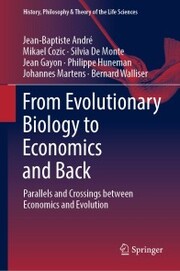Detailansicht
From Evolutionary Biology to Economics and Back
eBook - Parallels and Crossings between Economics and Evolution, History, Philosophy and Theory of the Life Sciences
Walliser, Bernard/Gayon, Jean/Martens, Johannes et al
ISBN/EAN: 9783031087905
Umbreit-Nr.: 8124709
Sprache:
Englisch
Umfang: 0 S., 5.41 MB
Format in cm:
Einband:
Keine Angabe
Erschienen am 12.01.2023
Auflage: 1/2023
E-Book
Format: PDF
DRM: Digitales Wasserzeichen
- Zusatztext
- This book offers a comprehensive exploration of the major key concepts common to economics and evolutionary biology. Written by a group of philosophers of science, biologists and economists, it proposes analyses of the meaning of twenty-five concepts from the viewpoint respectively of economics and of evolutionary biology each followed by a short synthesis emphasizing major discrepancies and commonalities. This&nbsp;analysis is surrounded by chapters exploring the nature of the analogy that connects evolution and economics, and chapters that summarize the major teachings of the analyses of the keywords. Most scholars in biology and in economics know that their science has something in common with the other one, for instance the notions of competition and resources. Textbooks regularly acknowledge that the two fields share some history Darwin borrowing from Malthus the insistence on scarcity of resources, and then behavioral ecologists adapting and transforming game theory into evolutionary game theory in the 1980s, while Friedman famously alluded to a Darwinian process yielding the extant firms. However, the real extent of the similarities, the reasons why they are so close, and the limits and even the nature of the analogy connecting economics and biological evolution, remain inexplicit. This book proposes basis analyses that can sustain such explication. It is intended for researchers, grad students and master students in evolutionary and in economics, as well as in philosophy of science.<div><br></div>
- Autorenportrait
- <div><p>Jean-Baptiste André is a researcher at the CNRS, working at the Département dEtudes Cognitives of the Ecole Normale Supérieure - PSL Research University. He is a theoretician in evolutionary biology, working on human social behavior with an evolutionary perspective, and interested primarily in the evolution of cooperation and morality.</p><p>Mikaël Cozic is Professor of contemporary philosophy at the University of Lyon 3. He works on the methodology of economics and decision theory. His research concerns also formal theories of epistemic and practical rationality, mainly in the Bayesian tradition.<br></p></div><div>Silvia De Monte. Researcher at the Institute of Biology of Ecole Normale Supérieure (CNRS/ PSL Research University), Paris, and at the Max Planck Institute for Evolutionary Biology, Plön, Germany. Her research focuses on the ecology and evolution of collective behaviours, notably in microbial populations, combining mathematical models and analysis of observational data.<br></div><div><br></div><div><p>Jean Gayon. Historian and philosopher of science. He was a former Professeur at the Université Paris I Panthéon Sorbonne, and former director of the Institut d'Histoire et de Philosophie des Sciences et des Techniques (CNRS / Université Paris I Panthéon / Sorbonne).<br></p><p></p></div>Philippe Huneman. Research Director at the Institut dHistoire et de Philosophie des Sciences et des Techniques (CNRS / Paris I Sorbonne). Philosopher of biology, he works on the philosophy of evolutionary biology and ecology, and especially issues regarding natural selection, individuality, organisms and explanatory types. <p></p><p>Johannes Martens is a philosopher of biology and a permanent researcher at the CNRS in Paris (Sorbonne University). His works concern primarily the theoretical structure and the philosophical implications of social evolution theory.<br></p><p>Bernard Walliser is a researcher at Paris School of Economics (Ecole Normale Supérieure) and at Ecole des Hautes Etudes en Sciences Sociales in Paris. His research concerns mainly the social impact of economic agents beliefs, conceptualized in a game theory framework, as well as different topics in economic methodology.<br></p>
